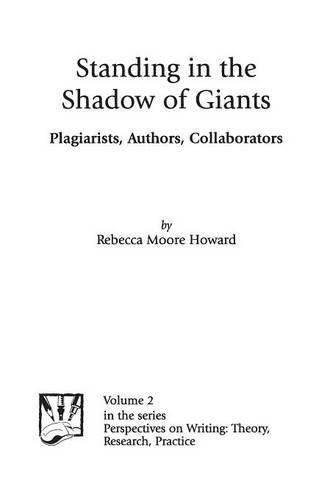
Standing in the Shadow of Giants: Plagiarists, Authors, Collaborators
(Paperback)
Available Formats
Publishing Details
Standing in the Shadow of Giants: Plagiarists, Authors, Collaborators
By (Author) Rebecca Moore Howard
Bloomsbury Publishing PLC
Praeger Publishers Inc
18th May 1999
United States
Classifications
Tertiary Education
Non Fiction
Teaching of a specific subject
808
Physical Properties
Paperback
224
Width 156mm, Height 235mm
312g
Description
Who's cheating whom in college writing instruction This book argues that through binary privileging of the real author (the inspired, autonomous genius) over the transgressive writer (the collaborator or the plagiarist), composition pedagogy deprives students of important opportunities to join in scholarly discourse and assume authorial roles. From Plato's paradoxical dependence on and rejection of Homer, to Jerome McGann's dismissal of copyright as the hand of the dead, Standing in the Shadow of Giants surveys changes and conflicts in Western theories of authorship. From this survey emerges an account of how and why plagiarism became important to academic culture; how and why current pedagogical representations of plagiarism contradict contemporary theory of authorship; why the natural, necessary textual strategy of patchwriting is mis-classified as academic dishonesty; and how teachers might craft pedagogy that authorizes student writing instead of criminalizing it.
Reviews
"Comprehensive and thoughtful, her book reviews the history of rhetoric to discover how the direct incorporation of an author's words without explicit acknowledgement, what we call plagerism, has slipped from its place as a recognized and valuable mode of classical and medievil scholarly discourse to that which is "immortal, transgressive-a threat to culture, the academy, and writing"926). Her final recommendations for pedagogy and policy will challenge many readers to radically re-think their definitions of plagiarism and their process for teaching students to master academic writing....This book gives us much to think about, and anyone pursuing a coherent understanding of plagerism in her university or classroom, or even her own scholarship, would be well-advised to consider the historical, theoretical, pedagogical, and professional discussions offered here....[t]his book demands that we direct our attention to plagerism with the integrity, complexity, and wisdom that our students deserve."-Composition Studies
Comprehensive and thoughtful, her book reviews the history of rhetoric to discover how the direct incorporation of an author's words without explicit acknowledgement, what we call plagerism, has slipped from its place as a recognized and valuable mode of classical and medievil scholarly discourse to that which is "immortal, transgressive-a threat to culture, the academy, and writing"926). Her final recommendations for pedagogy and policy will challenge many readers to radically re-think their definitions of plagiarism and their process for teaching students to master academic writing....This book gives us much to think about, and anyone pursuing a coherent understanding of plagerism in her university or classroom, or even her own scholarship, would be well-advised to consider the historical, theoretical, pedagogical, and professional discussions offered here....[t]his book demands that we direct our attention to plagerism with the integrity, complexity, and wisdom that our students deserve.-Composition Studies
Author Bio
REBECCA MOORE HOWARD chairs and directs the Writing Program at Syracuse University. She is co-author of Standing in the Shadow of Giants (1999), The Bedford Guide to Teaching Writing in the Disciplines (1995), and co-editor of Coming of Age: The Advanced Writing Curriculum (2000 forthcoming).
